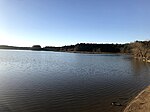AVAir Flight 3378
1988 in North CarolinaAccidents and incidents involving the Fairchild Swearingen MetrolinerAviation accidents and incidents caused by pilot errorAviation accidents and incidents in North CarolinaAviation accidents and incidents in the United States in 1988 ... and 3 more
February 1988 events in the United StatesUse American English from September 2019Use mdy dates from September 2019

AVAir Flight 3378, was a scheduled flight under the American Eagle branding from Raleigh–Durham International Airport to Richmond International Airport which crashed after takeoff from Raleigh-Durham International Airport late on the night of February 19, 1988. All 12 people on board were killed in the accident.
Excerpt from the Wikipedia article AVAir Flight 3378 (License: CC BY-SA 3.0, Authors, Images).AVAir Flight 3378
Aviation Parkway,
Geographical coordinates (GPS) Address Nearby Places Show on map
Geographical coordinates (GPS)
| Latitude | Longitude |
|---|---|
| N 35.869 ° | E -78.81 ° |
Address
Aviation Parkway
Aviation Parkway
27650
North Carolina, United States
Open on Google Maps








